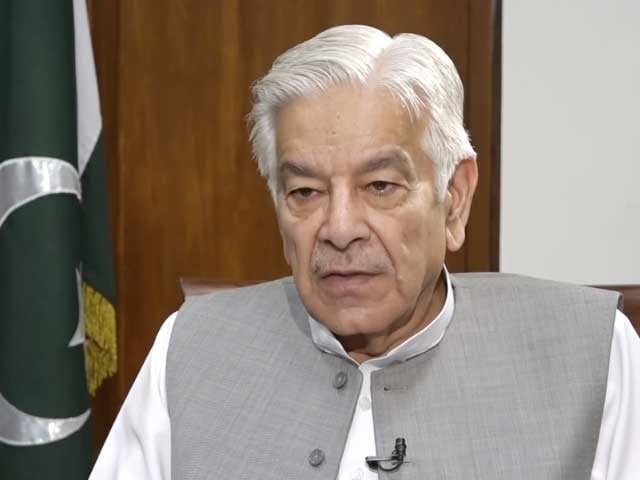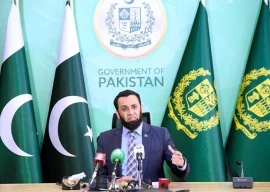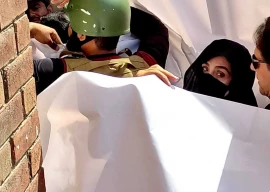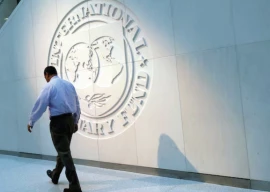
A day after the Shehbaz Sharif-led coalition government handed the Inter-Services Intelligence (ISI) more muscle to monitor and intercept communications, the ruling party on Tuesday justified the controversial move under the umbrella of “national security.”
The decision, arriving on the heels of a high court judge’s slap on the wrist over “the criminal act” of phone surveillance, has sparked a firestorm of criticism amid concerns of misuse of powers and violation of fundamental rights.
While the ruling coalition has dug in its heels, staunchly defending the move to legitimise ISI’s beefed-up powers, the Pakistan Tehreek-e-Insaf (PTI) and the Pakistan Bar Council (PBC) have come out swinging, condemning the notification that grants sweeping powers to the spy agency under the guise of national security.
In a strong rebuke, PTI questioned the oversight of such extensive powers, pointing out the absence of specified parameters to prevent misuse.
Vowing to challenge the government’s move, the former ruling party has questioned “who will monitor misuse of such powers as no parameters have been specified.”
In a statement, PTI not only vehemently condemned the decision to give blanket powers to ISI to intercept calls and messages in sheer violation of the constitution and law but demanded the Supreme Court to annul the notification immediately.
The controversy centres around a Ministry of Information Technology and Telecommunication notification citing Section 54 of the Pakistan Telecommunication (re-organisation) Act of 1996 as the legal basis for granting ISI authority to tap phones.
“In exercise of the powers conferred under Section 54 … the federal government in the interest of national security and in the apprehension of any offence, is pleased to authorise the officers not below the rank of grade 18 to be nominated from time to time by the Inter-Services Intelligence (ISI) to intercept calls and messages or to trace calls through any telecommunication system as envisaged under Section 54 of the Act,” the notification read.
‘A fascist government’
Leader of the Opposition in the National Assembly Omar Ayub reportedly slammed the government, saying that “only a fascist government would grant an intelligence agency complete authority to tap citizens’ phones”, adding that “[PM] Shehbaz Sharif has practically cut his own throat with this decision.”
The opposition leader said that the move could backfire and could have great consequences, further incorporating that “this SRO will be the tool the ISI uses to blackmail and subjugate all politicians and media persons, including Bilawal Bhutto, Asif Zardari, and Maryam Nawaz”.
The PTI leader announced his intention to challenge the notification in court through his lawyer, Dr Babar Awan. “This SRO is unconstitutional and against the fundamental rights enshrined in the Constitution,” he protested.
Nevertheless, it was reported, that Minister for Law and Justice Azam Nazir Tarar defended the government’s move, arguing that the step has been taken to enhance the anti-terrorism measures. He clarified that it was not an attempt to end the rights of citizens to liberty and privacy.
The law minister chided the opposition by saying that the telegraph law was already present since 1996, adding if it was that bad then why it wasn’t repealed by the successive governments. Section 54 (National Security) (1) states: “Notwithstanding anything contained in any law for the time being in force, in the interest of national security or in the apprehension of any offence, the Federal Government may authorise any person or persons to intercept calls and messages or to trace calls through any telecommunication system.”
This means the government has designated a Grade-18 officer from the ISI to oversee the interception of phone calls and other communications.
Addressing the National Assembly, the minister explained that such notifications are periodically issued by the government. He cited incidents such as the assassination of former prime minister Benazir Bhutto and DIG Mobeen, where perpetrators of serious crimes were apprehended through lawful interception by intelligence agencies under existing laws.
PBC alarmed by ‘sweeping powers’
However, the move hasn’t been well-received by the PBC as it not only condemned the move but termed such “sweeping powers” alarming and unjustified.
The bar council noted that the issuance of notification is in direct violation of fundamental rights; and undermines the principles of the independence of the judiciary and the rule of law. It noted that the timing of the notification was troubling given the ongoing proceedings before the apex court and the Islamabad High Court (IHC).
“This act by the federal government represents a blatant disregard for the rule of law and judicial independence,” the PBC stated, adding that the notification infringes upon the dignity and security of individuals and violates the right to life and privacy.
Terming the government’s actions “unconstitutional”, the PBC said that it is also deeply disrespectful to the rule of law, arbitrary and not bonafide as no criteria for intercepting of calls, messages and tracing has been laid down.
PBC said that the government failed to provide valid justification; and hasn’t specified the circumstances or threats that necessitated such extreme measures, saying the lack of transparency and accountability is unacceptable and raises serious concerns about the motives behind it.
Despite the opposition’s backlash, PM Shehbaz’s decision to allow phone tapping is not the first instance where the spy agency has been given legal permission to spy on its citizens. During his first stint as the prime minister, PM Shehbaz had tasked ISI to vet govt officers.
In June 2022, just months after coming into power by ousting ex-PM Imran Khan via a vote of no-confidence, PM Shehbaz granted the status of a Special Vetting Agency (SVA) to ISI, empowering it to complete verification and screening of all government officers for induction, important posting/appointments and promotions.
Surprisingly, the government’s move to legalise surveillance follows a recent ruling by Justice Babar Sattar of the Islamabad High Court in the audio leaks case, which involved allegations from figures including former prime minister Imran Khan’s wife, Bushra Bibi, claiming illegal surveillance.
The petitioners said that their private phone conversations were recorded and subsequently released to social media with the object of manufacturing criminal charges against them and/or to intimidate and blackmail them.
In the judgment, Justice Sattar noted that any surveillance being undertaken in breach of the Fair Trial Act is a criminal act. And to the extent that the “Lawful Intercept Management System” has been installed under the direction and supervision of the state that enables the state to undertake mass surveillance of over 4 million citizens simultaneously, the liability rests with the federal government.
“The prime minister and the members of his cabinet are individually and collectively responsible for the existence and operation of any mass surveillance system if it turns out that such surveillance is being or has been undertaken,” Justice Sattar stated.
The court had asked the prime minister to solicit appropriate reports from all the intelligence agencies that ultimately report to him and place the matter before the federal cabinet.
It ruled that the PM shall have a report filed on behalf of the federal government as to whether, firstly, surveillance was being undertaken in Pakistan in breach of provisions of the Fair Trial Act, Telecom Act and Telegraph Act, in a manner that undermines Articles 9, 14, and 19 of the Constitution.
Secondly, the judge asked who bears responsibility for installing the Lawful Interception Management System in contravention of provisions outlined in the Telecom Act and Fair Trial Act, and who should be held accountable for implementing a mass surveillance system that violates citizens’ constitutional rights and statutory obligations.
Thirdly, he raised concerns about oversight of the surveillance system’s operation and liability for breaches of citizens’ privacy rights, particularly regarding the unauthorized release of data accessed through the Lawful Interception Management System on social media.




1721116817-0/2668677-bannuattack-1721116568-295-640x480-(1)1721116817-0-270x192.webp)














COMMENTS
Comments are moderated and generally will be posted if they are on-topic and not abusive.
For more information, please see our Comments FAQ